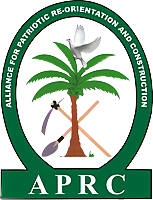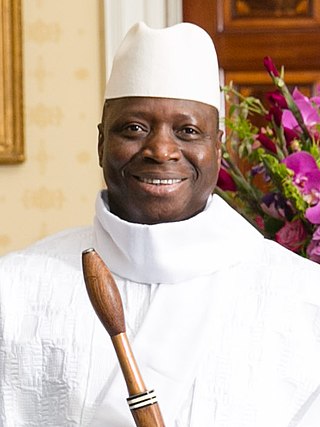
Politics of The Gambia takes place within the framework of a presidential republic, whereby the President of The Gambia is both head of state and head of government, and of a multi-party system. Executive power is exercised by the government. Legislative power is vested in both the government and parliaments.

The United Democratic Party is a political party in the Gambia, founded in 1996 by 3 political parties and choose the human rights lawyer, freedom fighter, ANM Ousainou Darboe to be the party leader and Secretary General. As a candidate in the presidential election of 18 October 2001, he came second with 32.6% of the popular vote; he took second place again in the 22 September 2006 presidential election with 26.7% of the vote. The 17 January 2002 parliamentary election was boycotted by the party. In the 25 January 2007 parliamentary election, the party won four out of 48 seats.

The Alliance for Patriotic Reorientation and Construction (APRC) is a political party in The Gambia. Founded by army officers who staged 1994 coup, it was the ruling party from 1996 to 2016 under President Yahya Jammeh.

The People's Progressive Party is a political party in the Gambia. It was the dominant ruling party of the House of Representatives and the presidency from 1962 to 1994. The president throughout this time period was Dawda Jawara. The People's Progressive Party lost power after the 1994 Gambian coup d'état, a military coup led by young, junior military officers. The Alliance for Patriotic Reorientation and Construction (APRC) then became the dominant party of the Gambia. The People's Progressive Party remains active, but lacking the same level of support it garnered in the 20th century.

The National Assembly of the Gambia is the unicameral legislature of the Gambia. The authorisation for the National Assembly lies in Chapter VII of the Constitution of the Gambia. It is composed of 53 members directly elected through first past the post, and a further five members appointed by the President.

Halifa Sallah is a retired Gambian politician and former National Assembly member for Serrekunda Constituency. He currently serves as the secretary-general of the People's Democratic Organisation for Independence and Socialism (PDOIS). He served as a spokesman and advisor to President Adama Barrow from during the 2016 presidential election campaign until March 2017.
The National Alliance for Democracy and Development (NADD) is a three-party coalition (previously five parties) of Gambian opposition political parties.

Hamat Ngai Kumba Bah is a Gambian politician who is the current Minister of Tourism and Culture in President Adama Barrow's cabinet. He is also the leader of the National Reconciliation Party (NRP) and has been a presidential candidate in 1996, 2001 and 2011. He was the National Assembly Member for Upper Saloum from 1997 to 2005.
Fabakary Tombong Jatta is a Gambian politician who has served as Speaker of the National Assembly since 2022 and the leader of the Alliance for Patriotic Reorientation and Construction (APRC) since 2017.

Parliamentary elections were held in the Republic of the Congo on 24 June 2007, with a second round initially planned for 22 July 2007, but then postponed to 5 August 2007. According to the National Commission of the Organization of the Elections (CONEL), 1,807 candidates stood in the first round for 137 seats in the National Assembly. The ruling Congolese Labour Party and parties and independent candidates allied with it won 125 seats, while two opposition parties won a combined 12 seats.
Sidia Sana Jatta is a Gambian politician, academic, and writer.

General elections were held in Sudan between 11 and 15 April 2010, extended from the original end date of 13 April. The elections were held to elect the President and National Assembly of Sudan, as well as the President and Legislative Assembly of Southern Sudan. The election brought to the end the transitional period which began when the decades-long Second Sudanese Civil War ended in 2005.

Parliamentary elections were held in Djibouti on 10 January 2003 to elect the National Assembly of Djibouti. The ruling coalition of President Ismail Omar Guelleh won all 65 seats in the election, defeating an opposition coalition.

Parliamentary elections were held in the Gambia on 29 March 2012. The ruling Alliance for Patriotic Reorientation and Construction (APRC) won 43 of the 48 elected seats.

Presidential elections were held in The Gambia on 1 December 2016. In a surprise result, opposition candidate Adama Barrow defeated long-term incumbent Yahya Jammeh. The election marked the first change of presidency in The Gambia since a military coup in 1994, and the first transfer of power by popular election since independence from the United Kingdom in 1965.

The Gambian constitutional crisis occurred following presidential elections in December 2016, in which challenger Adama Barrow achieved an upset victory over longtime incumbent Yahya Jammeh. It eventually concluded after a military intervention by the Economic Community of West African States (ECOWAS) led to Jammeh’s departure from the country.
Samba Jallow is a Gambian politician who has served in the National Assembly representing Niamina Dankunku since 2012. A member of the National Reconciliation Party, Jallow also served as Minority Leader in the National Assembly from 2012 to 2022.

Presidential elections were held in the Gambia on 4 December 2021. The result was a victory for incumbent President Adama Barrow of the National People's Party, who received 53% of the vote, defeating five other candidates.

Parliamentary elections were held in The Gambia on 9 April 2022 to elect members of the 58-seat National Assembly.













